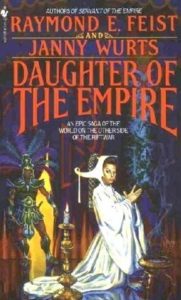
As I wrap up my hard mode Bingo card, I’m tackling a few of the most difficult-to-fill squares on the board. But Backlist (hard mode: published before 2000) is an exception—while I certainly wouldn’t naturally come across examples while reading for the Hugos or SPSFC, I had so many intriguing options that I simply had a hard time choosing which to crack open and read. Ultimately, it came down to format and whether I had time to make a library trip, and I ended up pulling off the shelf Daughter of the Empire by Raymond E. Feist and Janny Wurts.
Daughter of the Empire was published in 1987 as a generally freestanding trilogy in the Riftwar universe that made up the majority of Feist’s catalog. I had not previously read Feist, so I came into the book without any background on the universe. And that background is probably unnecessary, as Daughter of the Empire is a pure political scheming novel with a tight focus on the central character. It stars Mara, a teenage girl on the verge of giving up her inheritance to take on religious vows when news comes about the death of both her father and her brother, along with most of their complement of warriors. Suddenly, a second child has the survival of her entire house resting on her shoulders. And her family’s enemies are eager to pounce on any weakness they can find.
I don’t regularly read 80s fantasy, so I make a poor judge of how the novel fits into its own zeitgeist, but from more than 30 years later, two choices in particular surprised me. First, Daughter of the Empire takes on a fairly episodic style, with various threats rising and falling over the course of the book, as opposed to a series of escalating confrontations leading to a big finish. And second, it delivers a main character that is utterly ruthless.
Make no mistake, the events of the book are all interwoven, and the biggest and most dangerous confrontation certainly serves as the finish. But Mara faces an unending parade of threats, and while they all relate in some way to the precarious position of her house, they are otherwise fairly independent. Dealing with one may strengthen her position as she approaches the next, and properly navigating that may provide further boon, but it’s not as if she’s building the pieces to enable her to survive a final confrontation. Some victories affect everything she does for the remainder of the story, while others are ignored almost entirely, perhaps lying in wait for further exploration in the sequel. The episodes themselves are interesting—though I’d probably prefer if Mara’s complicated schemes were a little bit less reliable—but if you’re looking for a strong overarching narrative, you won’t find it.
While the schemes of Mara and her enemies provide the bulk of the conflict, the development of Mara herself serves just as big a role in the success of the novel. And Mara was certainly not what I expected. She opens the story intelligent and savvy, but over the course of the novel, she is constantly forced to make decisions that contradict her moral sensibilities in order to keep her house afloat. And, while those decisions come with no lack of consternation, they shape a ruthlessness that I’ve come to expect from the contemporary trend of morally gray women as leads, but that I absolutely did not expect from a book released 30 years before those trends calcified. And perhaps this is just ignorance of the breadth of older fantasy, but I do see Daughter of the Empire approach that ruthlessness differently than contemporary fantasy. It lingers on some horrors—and there are horrors aplenty—while skirting lightly over others, working all the while (successfully, I might add!) to maintain the image of Mara has a sympathetic figure who simply does what she must with the hand she’s been dealt.
I haven’t read Feist before and can’t compare to his other works, but if you’re at all familiar with Wurts, you can expect high-quality prose that never rushes but doesn’t have quite the ornamentation you’d find in her Wars of Light and Shadow series. Overall, if you like clever lead characters who are willing to get their hands dirty when the situation requires, Daughter of the Empire has much to recommend it. The central character is compelling, the storytelling is engaging, and it resolves key crises while leaving plenty of story to tell in future installments. However, this is not for a reader who needs a strong overarching plot, a morally uncomplicated lead, or enemies with wits to match the heroine.
Recommended if you like: scheming books, ruthless leads.
Can I use it for Bingo? This hits a treasure trove of 2021 Bingo squares, with hard mode for Backlist and Revenge-Seeking Character, while also having Chapter Titles, an X of Y title, and an Asian Setting.
Overall rating: 15 of Tar Vol’s 20. Four stars on Goodreads.

I’m always glad to see this book get some love, as it’s very good and – as you say – doing what’s now the trend only thirty years before. Although I have to say I’ve never seen Mara as unusually morally complicated for the time – this sentence “lingers on some horrors—and there are horrors aplenty—while skirting lightly over others, working all the while (successfully, I might add!) to maintain the image of Mara has a sympathetic figure who simply does what she must with the hand she’s been dealt” covers a lot of the big names from around that period for my money.